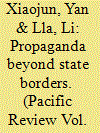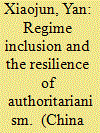|
|
|
Sort Order |
|
|
|
Items / Page
|
|
|
|
|
|
|
| Srl | Item |
| 1 |
ID:
180467


|
|
|
|
|
| Summary/Abstract |
Cultural security has become a major watchword in the national security discourses of both the People’s Republic of China and the Kingdom of Saudi Arabia. Within this discourse, overseas study has been imagined as a conduit for cultural and ideological subversion threatening the authority of the prevailing regimes. At the same time, overseas study has been actively encouraged by both the Chinese and Saudi states as an important element in their modernization projects. In the past two decades, the Chinese and Saudi overseas student populations have been some of the largest in the world. The article seeks to explore these tensions by examining the conceptualization and practice of cultural security in the PRC and Saudi Arabia through their management of overseas study.
|
|
|
|
|
|
|
|
|
|
|
|
|
|
|
|
| 2 |
ID:
171315


|
|
|
|
|
| Summary/Abstract |
What has driven China, a developing country that has only recently saved itself from nationwide poverty, to increase its investment in social welfare so rapidly and extensively in the past decade? Drawing on extensive field research in a prefecture-level district in southwest China between 2014 and 2017, the authors argue in this article that local governments in China provide welfare housing programmes as a veil for developmentalist industrial policies aimed at industrial upgrading and the improvement of dynamic efficiency. The article demonstrates the unique incentive structure behind the local Chinese governments’ role as the front-line investor in social welfare benefits, and how the local state has cunningly used the façade of welfare provision to (1) divert the earmarked budget to implement development-oriented industrial policy; and (2) fake a discursive congruence between the heavily interventionist local practice and the overall neoliberal central-level policy discourse that features deregulation, small government and a laissez-faire developmental pathway. Exploring this set of strategic dynamics underlining the manoeuvres of the Chinese welfare operation helps us understand the variability of welfare state forms and trajectories of developmental strategy in the Global South.
|
|
|
|
|
|
|
|
|
|
|
|
|
|
|
|
| 3 |
ID:
180445


|
|
|
| 4 |
ID:
192536


|
|
|
|
|
| Summary/Abstract |
Today, authoritarian states, such as that of China, strive to cultivate political allegiance among their diasporic subjects through state-run propaganda operations beyond national borders. Aiming to construct a stable, exclusive, and institutionalized diasporic network of influence within host societies, autocratic states use extraterritorial propaganda to amass integrative capacity by dispersing carefully tailored discourses, penalizing opposing voices, promoting a unified interpretive framework for conceptualizing socio-political reality, forming a standard meaning system for diasporic communities, coordinating collective action, and forging an integrated patriotic identity through the repetition of codified communication. The early 21st century has witnessed the rise of pro-regime solidarity among diasporic Chinese, a global force buttressing China’s communist regime. In this article, we argue that this unprecedented forging of solidarity is the product of China’s extra-territorial propaganda. The ruling party-state consistently uses concise, catchy, and carefully tailored symbolic resources, such as ‘China insult’ (ruhua) incidents, to extend its political influence beyond national borders. This poses novel challenges to the Westphalian sovereign state. The state’s tactic overseas propaganda operations have facilitated the emergence of an extraterritorial Chinese ‘symbolic state’ that relies on shared symbolism and identity, rather than territorially defined Weberian coercion, to project control over a transnational socio-political domain.
|
|
|
|
|
|
|
|
|
|
|
|
|
|
|
|
| 5 |
ID:
106759


|
|
|
| 6 |
ID:
114855


|
|
|
|
|
| Publication |
2012.
|
| Summary/Abstract |
This article examines the profound transformation market reforms have brought to the leadership of the Chinese Communist Party's (CCP) rural grassroots organizations. Focusing on the political rise of private entrepreneurs and other economically successful individuals who recently obtained village Party secretary appointments in a north China county, the article explores their differing promotion channels, power bases, political resources and motivations to take up the CCP's grassroots leadership position. It demonstrates that the variety among the new entrepreneurial Party secretaries - from large factory owners to de facto farm managers - shaped the network resource, factional affiliation and socio-political capital they rely upon to exercise their newly attained power. It also shows the crucial role played by community-based endogenous forces in transmitting the power of economic liberalization into dynamics for the reshuffling of the Communist Party leadership at the grassroots level.
|
|
|
|
|
|
|
|
|
|
|
|
|
|
|
|
|
|
|
|
|